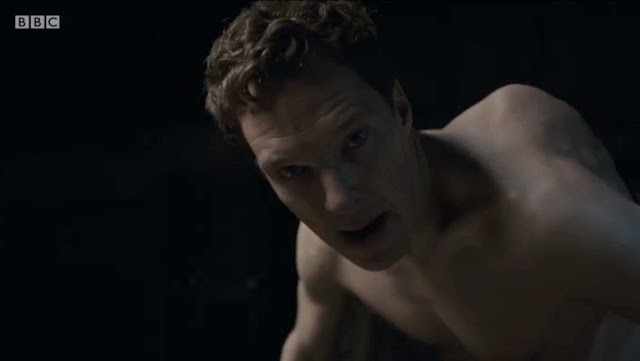 |
| Now is the winter of our discontent
Made glorious summer by this son of York; |
To put it simply, I think his acting is incomparable and here's why!
Why, this it is, when men are rul’d by women:
’Tis not the King that sends you to the Tower;
My Lady Grey his wife, Clarence, ’tis she
That tempers him to this extremity.
Mean time, this deep disgrace in brotherhood
Touches me deeper than you can imagine.
Go tread the path that thou shalt ne’er return:
Simple plain Clarence, I do love thee so
That I will shortly send thy soul to heaven
This third installment of The Hollow Crown: Wars of the Roses shifts the focus from the warring red and white blooms to the sharpest thorn of the white rose, that infamous Richard. From here on out he drives the plot, and Benedict handles the role so masterfully that we in the audience are enthralled as we are reluctantly driven along by this charismatically murderous man.
Was ever woman in this humor woo’d?
Was ever woman in this humor won?
I’ll have her, but I will not keep her long.
What? I, that kill’d her husband and his father,
To take her in her heart’s extremest hate,
With curses in her mouth, tears in her eyes...
And yet to win her! All the world to nothing! Hah!
If it is possible, the gentleman keeps surpassing himself, and the case of Richard III is no exception. He is so villainous that the film leaves you huddling in the corner while you applaud in speechless awe. He reaches the ultimate in being both subtle and dynamic. There are hundreds of tiny nuances to catch if you watch him closely, while at the same time his character explodes off the screen because there is so much energy and power coming from him.
And the fact that he happens to be in the starring role makes this film just too tempting to miss.
"Subtle, sly and bloody" – that is how Richard's mother describes him, and that is exactly what we see. The screenwriters and director Dominic Cooke did an excellent job in purposefully narrowing the focus down to Richard over the three films, by tracking how he got to the throne and how and why he turned out as he did. They were wise enough to achieve this focus by giving the audience ample shots of Benedict's face. Of course the nature of Shakespeare's play already gives Richard many opportunities to show his face to the audience with his asides and soliloquies. But it is satisfying to see how those involved in the film went even further in that important particular, and have many shots of Benedict when he isn't speaking to the audience (or speaking at all).
This brings me to one advantage that film sometimes has over live theater. When we are watching a group of actors on the stage it is impossible to see the reactions of every character, especially of those who aren't speaking. But in a film like this every expression of Benedict's is put right in front of our eyes. I don't always appreciate this fact in other films, but, as I've already said, every moment of his performance is riveting, so in this case I say it is an excellent idea.
Then be your eyes the witness of their evil.
Look how I am bewitch’d; behold, mine arm
Is like a blasted sapling, wither’d up;
And this is Edward’s wife, that monstrous witch...
If? Thou protector of this damned strumpet,
Talk’st thou to me of “ifs”? Thou art a traitor.
Off with his head!
Another way in which they took their queue from Shakespeare is in the almost exaggerated theatricality of Richard, in both his actions and his speech. Richard Gloucester is such a drama queen! (Sound familiar Sherlock fans?) Now an actor could easily overdo this, but of course Benedict is the master of playing emotionless men who can convincingly feign every emotion under the sun. He is the master actor playing the master manipulator, and he does so, perfectly!
In Henry VI Part Two we saw the beginnings of Richard's skills in manipulation via taking on whatever rôle would best serve his own ends, and now in Richard III we see him use those skills with the expertise of a surgeon wielding a scalpel. He gets an idea into his head, and then we sit back and watch him put all of his skill into action to achieve his ends by playing on peoples' emotions, spreading rumors, pointing fingers, painting himself as the the victim, and threatening people to take his side. Part of the power of Benedict's performance, and of the role itself, is that we as the audience always know Richard is manipulating people with his displays of emotion (because he tells us), yet at the same time he is so effective that we almost have to applaud the skill of his performance. But still more dazzling is how believable Benedict is as he brings Richard to life.
Richard tells us outright that he is subtle, false and treacherous, plotting murder after murder unapologetically, and it is this brazen energy that Benedict captures and keeps us riveted to the screen. Not for one second does Benedict's performance lose that zeal and relentless ambition. It actually gains a sort of fanatical determination as he begins loosing his dubious grip on the crown, so that when the film finally ends you're sitting there breathlessly coming to grips with this turning, twisting, racing, remorseless ride you've just endured.
Cousin, thou wast not wont to be so dull. Shall I be plain? I wish the bastards dead, And I would have it suddenly perform’d. What say’st thou now? Speak suddenly, be brief.
Now I've seen a few movies that wrung me out by the end of them and kept me thinking for a long time afterwards. But there was an unusual power in this one. Benedict is so real as Richard that I feel as if I've actually seen all of this happen – all of the plotting, ambition, murders, manipulation, revenge and heartlessness – and it is no easy thing to watch. That a human being could have done all that Richard does – and it is possible that the real Richard did a majority of it – is disturbing, and Shakespeare adds to that in the construction and dialogue of his play. Then Benedict grabs it and runs with it – straight in the direction Shakespeare pointed.
Benedict Cumberbatch has a gift for stretching any role to it's furthest limit while being able to keep his acting at the highest pitch of naturalness. Richard is a role where those limits stretch very far indeed, and it is possible for an actor to misread the direction and get slightly off by making him too theatrical and melodramatically villainous, especially with his physical deformity. But Benedict, by adhering to the standard of the natural, makes Richard as terrifying as possible because he tries – and succeeds – to make the villain real.
If I be so disgracious in your eye,
Let me march on and not offend you, madam.
Strike up the drum.
His Richard is theatrical, but theatrical in a real way. He hunches over and limps like any conventional villain might, but Benedict has obviously studied how that physicality would really effect a man's body. He gleefully boasts of his plans to the audience, but Benedict understands where Richard has come from, that his quickness is natural and his ambition was fed by the war for power he's been a part of all his life. He acts the way a clever person would when they get caught up in the enjoyment of their own plans and ability to manipulate – he understands that the frailty of genius is that it needs an audience. Even his speech is changed to reflect the character, with precise and punching consonants that seem so natural for the conspicuously dramatic Richard.
What he does is sheer brilliance! He brings this legendary character to life with startling skill. It feels like you've met Richard, and the effects of that meeting are completely terrifying and captivating all at once.
I would argue that what makes his Richard uniquely powerful is his ability to become the character so completely, from every explosion of manipulative emotion, down to the smallest raise of the eyebrow.
 |
Plots have I laid, inductions dangerous...
|
© Anna Morton 2016




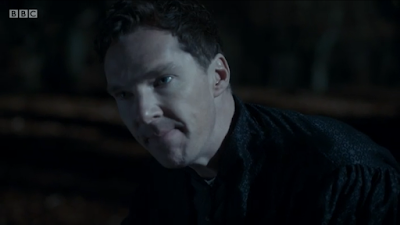










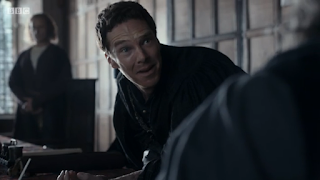




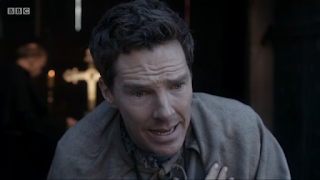


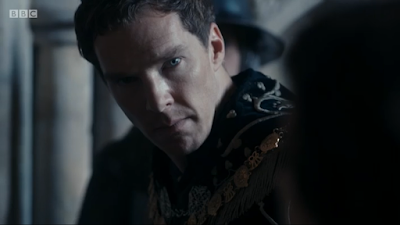







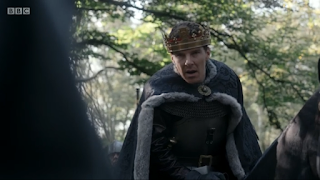








Fascinating insights, Anna! I too, felt almost as if I'd met Richard III.
ReplyDelete